Table of Contents
LSI (Latent Semantic Indexing) keywords are the phrases that are related to your targeted keyword. LSI helps search engines for better understanding. Once you mastered SEO, this strategy is the next level for you.
Using the proper LSI keyword is the best leading factor to rank your content on Google’s top search page. You can write a good blog with over 5K words, but some posts easily get ranked with 2K-3K words. So, in this article, we describe the tools to find Profitable LSI Keywords?
What are LSI Keywords?
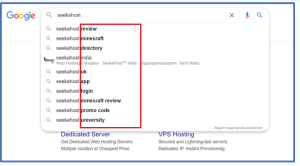 LSI Keywords are the phrases or words that are related to your main keyword semantically. That is not a single word (different words with the same meaning). In the early days, Google only used the LSI keywords. Now, all the search engines are using the LSI keyword with AI.
LSI Keywords are the phrases or words that are related to your main keyword semantically. That is not a single word (different words with the same meaning). In the early days, Google only used the LSI keywords. Now, all the search engines are using the LSI keyword with AI.
For example, you can search a topic on search engines, it not only shows your particular topic, additionally, but you can also see the relevant contents for your topic keyword.
Tips to Find the Profitable LSI Keywords
There are many tools available on the market for finding the best LSI keywords. Here we provide the best LSI keyword research tools for your knowledge.
- Google Keyword Planner
- LSI Graph
- Keyword Sheeter
1. Google Keyword Planner
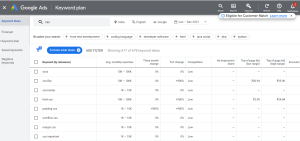 The Google keyword planner is a great tool for finding LSI. This tool is completely free for users. If you can use Google keyword planner, you should have a Google AdWords account.
The Google keyword planner is a great tool for finding LSI. This tool is completely free for users. If you can use Google keyword planner, you should have a Google AdWords account.
Once you got the screen given below, then you can easily find your related LSI Keywords for your topic keyword with a country and language. It gives two options for users are
- Find Keywords- It helps to find how people get interested in your products and services
- Get Search Volume and Forecast- You can see the historical metrics of your keywords for future forecasting.
2. LSI Graph

Image – Source
LSI Graph is the best tool to search for a profitable LSI keyword according to your main keyword. LSI Graph provides the list of keywords with a graph trend. So, you can easily get an idea of your keyword. If you are a free member, it allows you to search 3 keywords per day.
Once you got a premium, then you can search the multiple LSI keywords for your website. You can see the latest trends, volumes, and CPC in the LSI graph. LSI graph is one of the best premium tools for searching LSI keywords.
3. Keyword Sheeter
The keyword Sheeter is a completely free tool that comes with unlimited LSI suggestions. You can easily find the related LSI keywords without signup.
First, you should visit the Keyword Sheeter site. Then give the keyword in the given box.
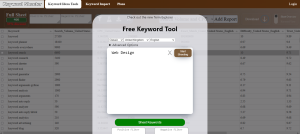
Once you can give the keyword, then click the Sheet Keywords button at the bottom of the Window.
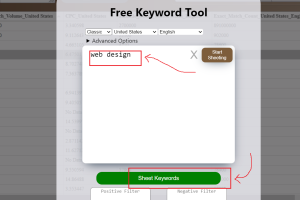 Finally, it gives a bunch of LSI keywords on which you alter focus.
Finally, it gives a bunch of LSI keywords on which you alter focus.
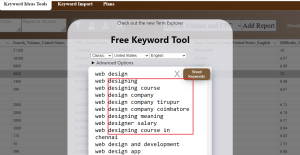 Then click the stop button and import your keywords.
Then click the stop button and import your keywords.
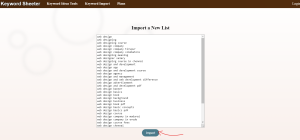 How to Find LSI Keywords Manually
How to Find LSI Keywords Manually
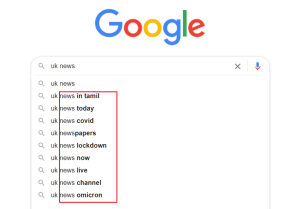 It is a free option and easy to use without any tools. The best way is you can get the keywords from popular search engines like Google, Bing, Yandex, and so on. How? Whenever you can search for any topics on a search engine, it provides additional suggestions. So, you can take that suggested keywords for your post.
It is a free option and easy to use without any tools. The best way is you can get the keywords from popular search engines like Google, Bing, Yandex, and so on. How? Whenever you can search for any topics on a search engine, it provides additional suggestions. So, you can take that suggested keywords for your post.
Benefits of Using LSI Keywords
LSI keywords provide many benefits for your content. Here we listed a few benefits of LSI,
- Improves Post Ranking
- Prevent Your Content Getting from Spam
- Increase Your Business Revenue
- Increase the Spend Time by Visitors
- Improves your Blog Authority
Conclusion
In this article, we listed the best tools for finding the LSI keywords for your main keyword. So, you can use the above tools and increase your organic traffic.
Disclaimer: The screenshot images used in this blog post are picked from Keywordsheeter.com and different websites. They are not owned by I Do Business. We have attached the source link, and the copyrights go to the respective website owners.


